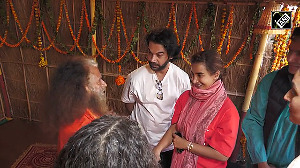The Hindu's correspondent in China Pallavi Aiyar will release her book Smoke and Mirrors: An Experience of China, published by Harper Collins India, this week. For the last five years, Aiyar has been living in China and reporting on developments there. On Thursday, she had a freewheeling chat with rediff.com readers on the fascinating story of a nation on the cusp of greatness. Following is the transcript:
Administrator says, Dear all, Ms Pallavi Aiyar will be with us shortly
Pallavi says, Hi everyone. Thanks for joining in the chat.
jayateerth asked, what do you feel about china is it a threat or friendly country
Pallavi answers, at 2008-05-21 17:01:06Is China a threat or a friendly country? If one tries to answer that without pride or prejudice, one will find that the answer lies somewhere inbetween. China today is a deeply pragmatic society and polity and acts out of a perception of its national self interest. Rather than being a threat or friend on an apriori basis Chinese actions can therefore both be friendly and threatning.
muki asked, What is the popular perception about India in China? Does India even figure in the minds of the Chinese population? Or is it the same kind of indifference that we have for our smaller neighbours like B'desh, Nepal, SL etc.
Pallavi answers, India figures in the minds of the Chinese much less thyan the other way around. This is because countries tend to benchmark themselves agianst those they perceive as more powerful. In China India is still perceived by the general public as a largely poor, developing country. There is a strong awareness of India as the birthplace of Buddhism and the country is often seen in religous terms. There is also amongst a certain demographic a love of vintage Hindi films...in particular Awaara and Caravan. Amongst the younger, educated crowd there is a growing awareness of India's software prowess and a sense that the economy is dynamic...however India is not a country the Chinese benchmark themselves against.
Kidoman asked, Hii pallavi.. We have heard so much abt chinese govt controlling thei media,people n lifestyle..Is it true???Have u faced any such issues in this 5 years..thx
Pallavi answers, China does not have a free media and all conventional media (print and broadcast) is state owned. The local propaganda departments send weekly circulars to editors with a list of topics that are off limits. These usually include issues like the Tiananmen Square massacre, the banned Falun Gong spiritual group and issues pertaining to national sovreignity, like unrest in Tibet. This being said, there is a growing space within which the domestic media have increasing room for manoeuvre...the recent earthquake is a case in point. The local media was unusually aggressive in reporting it, with up to date information on casualty figures...something that would have been unheard of 10 years ago when natural disasters were treated as state secrets. Besides, the Internet and blogosphere are increasingly lively spaces for the development of a nascent civil society. While the government seeks methods to tame and censor the Internet resourceful netizens are adept at circumventing controls.
Shweta asked, What India should learn from China and US relationship?
Pallavi answers, The China-US relationship is seemingly schizophrenic yet extremely functional, grounded in practical considerations. Ideologically the two stand opposed, yet in practice their economies have emerged as symbiotic. What India can learn from this is that foreign policy decisions need to be grounded in self-interest on a case-by-case basis rather than being decided on apriori ideological grounds. There is after all a large grey, nuanced space that lies between the extremes of an enemy and ally. And as Deng Xiaopung said: It doesnt matter if its a black cat or white cat as long as it catches mice!
Raju asked, Hi Pallavi, My greting for you. I always wonder how wealthy are the farmers in China in general. Are they at the mercy of rain gods like us. Are they economically secured. Thanks for taking time to reply my query
Pallavi answers, The major difference between Chinese farmers and Indian farmers is that in China land reform was enacted on a much wider scope...so that all farmers have a small plot of land to their name. They do not own this land, the state does, but they have lease rights to it. The problem of landless labourers is thus much less of an issue. Abject poverty is difficult to find in China today- the kind of poverty that sees people without clothes to wear and flies in the corner of their mouths. Relative poverty exists and income inequalities are growing but although the rich might be getting richer faster than the poor, the poor are also getting richer. The privatisation of health care over the last decade has had serious consequences for the rural poor, but as of 2005 policy directives are aimed at redressing this through the development of rural cooperative medical insurance schemes- that have thus far been partially succesful. Agricultural land is much more widely irrigated than in India- leaving farmers less at the mercy of inclement weather.
venu asked, Does China want to see a storng and powerful india ?
Pallavi answers, This is a difficult question to answer. However, my reading of the situation is that China would ideally like to remain unchallenged and unrivalled as the leading power in Asia. At the same time this does not mean that it will actively work towards ensuring India remains weak and underdeveloped. I think China is realistic enough to acknowledge and accept that countries like India are on the move and on the way up. This will require China to reconfigure its foreign policy thinking towards countries like India to make more room for them in China's strategic calculus. However, while accepting a stronger, more influential India China would be unhappy were India to become strong and powerful enough to pose a direct challenge to Beijing. As a result China is not above using tactics to keep India unsettled....even on the back foot. Simultaneously it will strive to engage and work with India on certain issues.
Princess asked, What is the first thing that struck you about China when you moved there from India?
Pallavi answers, The lack of visible poverty in the cities; the absence of stray animals on the road; the quantity of construction- cities seemed literally to be vomitting up buildings.
Hindi Chini Bye bye asked, India has culturally dominated China for the last 2000 years. Buddhism originated in India and then spread to China. Kung Fu orginated in India and then evolved in China.If our history prior to 1962 was peaceful, why then is our present so tense?
Pallavi answers, Its true that culturally India has really influenced China far more than the other way around- Buddhism being the primary and lasting Indian export north of the Himalayas.






 © 2025
© 2025